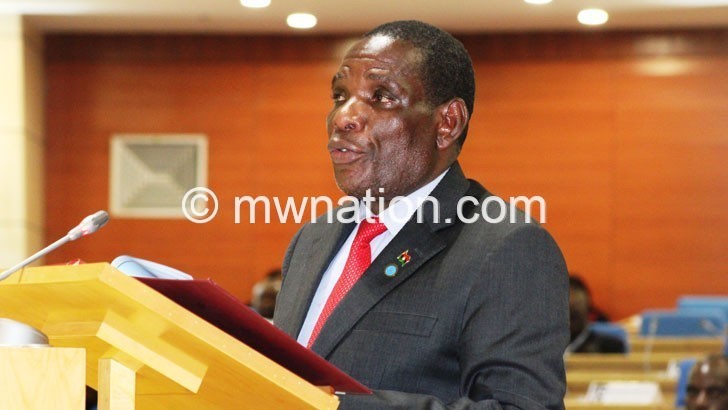Treasury withdraws mobile money tax
Minister of Finance, Economic Planning and Development Joseph Mwanamvekha has withdrawn a one percent withholding tax on mobile money transactions proposed in the 2019/20 National Budget following pressure from a number of stakeholders.
In his winding up statement made in Parliament on Monday, the minister, apparently succumbing to a recent public outcry over the proposed tax, said instead, government will introduce a 20 percent withholding tax on interest earned by Trust Funds and commission to mobile network operators (MNOs).

Said the minister: “Although this measure is in line with policy developments in other neighbouring countries, government has, however, proceeded to withdraw this proposed tax.”
But despite such a withdrawal, he maintained that the tax measure was aimed at ensuring that a large number of the citizens contribute towards nation-building through payment of taxes and also that government has scope to improve service delivery.
The decision to rescind the proposed tax followed reactions by Consumers Association of Malawi (Cama), Malawi Confederation of Chambers of Commerce and Industry, dean of law at University of Malawi’s Chancellor College Sunduzwayo Madise and TNM plc, among others.
In an interview on Tuesday, Cama executive director John Kapito said if the tax was implemented, it would have run counter to Malawi Government’s agenda on financial inclusion.
He said the tax could have thrown most average income earners into poverty, especially those that are unbanked but rely on mobile money wallet.
Earlier, Madise said the tax measure was going to disempower the rural people, the unbanked and underbanked.
And in a letter dated October 2 2019 to the minister, TNM plc chief executive officer Michiel Buitelaar said the one percent withholding tax on mobile money transaction was going to increase consumers’ transaction cost by at least 25 percent.
He said already, the mobile communications sector is subjected to higher taxation in excise tax, withholding tax on commissions, income tax, pay as you earn, Tevet levy and value added tax.
Buitelaar warned: “If the one percent transaction cost is implemented, a simple fund transfer transaction will result in a cost increase of 25 percent for the consumer, with the cost increasing further as the balance stands to be taxed for all subsequent transactions.”
In his statement, Mwanamvekha said government, through the Reserve Bank of Malawi (RBM) and Malawi Communications Regulatory Authority (Macra), will put measures to ensure that MNOs are not charging exorbitant fees and that incomes generated from the Trust Funds should be given back to the subscribers that use the non-bank mobile platforms.
“In this process, government will ensure that the tax regime remains fair and, therefore, we plead with all the citizens to comply and pay taxes so that government continues to improve delivery of public services through quality spending,” he said.
RBM figures indicate that as at June 2019, the total registered subscriber base for non-bank mobile money services stood at seven million with only 37.4 percent of the total mobile money subscribers using the service during the 90-day period under review.
The mobile money agent network, on the other hand, stands at 45 929 recorded at end of June 2019, with 81.1 percent of mobile money agents located in urban and semi-urban areas and only 18.9 percent available in rural areas to service more than 80 percent of the country’s population.





